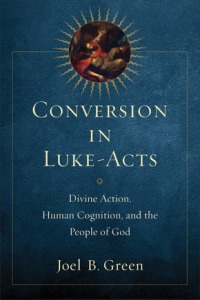2016.08.15 | Joel B. Green. Conversion in Luke-Acts: Divine Action, Human Cognition, and the People of God. Grand Rapids, MI: Baker Academic, 2015.
Review by Brandon T. Walker, St. John’s College, Nottingham.
Many thanks to Baker Academic for providing a review copy.
Much of the contemporary Western conversation about defining conversion has centred around questions of cognition and morality, repentance and conversion, or around attempts to discover patterns in a conversion narrative. In Conversion in Luke-Acts Joel B. Green offers an insightful take on Luke’s understanding of conversion by using a cognitive and holistic approach. Conversion is an important contribution to Lukan studies as well as understanding ‘conversion’ in antiquity.
In the first chapter Green surveys the pertinent questions concerning conversion in the New Testament (14–15), such as: ‘Is conversion a cognitive category, a moral category or both?’ (14). Read the rest of this entry »


